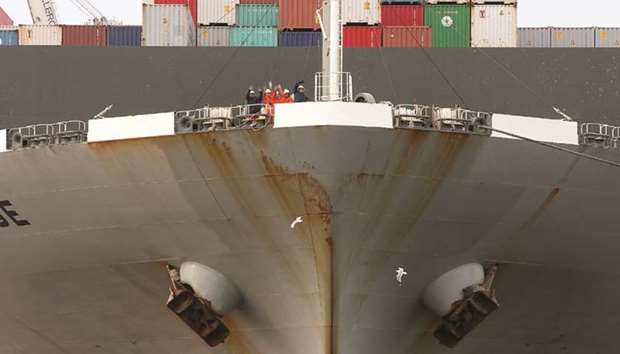Little contact with family members, living in confined spaces and always
being on call take a heavy psychological toll on seafarers.
With years of maritime sailing experience under his belt, Peter Geitmann now works to improve the lives of seafarers – many of whom have to deal with much more than long hours and rough seas.
“Seafarers who decide on this profession of course know what they are getting into,” says Geitmann, who is shipping secretary of Germany’s Verdi trade union. But they are often asked to do more than they can mentally handle, he adds.
At sea for several months at a time and working at least ten hours a day for seven days a week, crew members are always on call, have little contact with their families and live in a confined space with people from different cultures.
“You can’t just go to the cinema or out [to eat],” Geitmann points out, while medical experts also attest to many actual and potential problems for those who sail the world’s oceans for a living.
“Life on board is an extreme situation, especially when you are young and haven’t spent much time away from home before,” says Manuel Burkert, a doctor who dispenses advice by radio to male and female crew members from Cuxhaven in northern Germany.
On three occasions, he has diagnosed psychotic episodes triggered by the ship’s working conditions. “But this is very rare,” Burkert emphasises.
However, typical symptoms of psychological overburdening are not usually brought to the attention of a physician on land, and will gradually accumulate. For example, a recent survey of 300 seafarers conducted by Germany’s Transport and Traffic Industry Association (BG Verkehr) shows that affected people often deal with their stress on board by eating too much unhealthy food and smoking more.
In worse cases there will be mood swings, sleep disorders and depression. Many seafarers also suffer from chronic fatigue, which can easily lead to accidents.
Aid organisation Mehrblick recently held a series of person-to-person consultations with seamen in the port of Hamburg. The response to the call for participation surprised the organisers.
“We had a huge number of people wanting to see us,” says Hamburg deacon Maike Puchert, who participated in the sessions. Many of the sailors believed they had a visual defect because they were suffering from flickering eyelids and watery eyes. In fact, these were symptoms of sheer exhaustion.
“Many crew members have fatigue etched on their faces,” says seaman’s pastor Werner Gerke, who regularly visits ships docked in the international port of Bremerhaven.
This is because the ship’s operation comes first, often at the expense of crew welfare. And for those from poorer countries, the stress is even greater – for seafarers from the Philippines or India, for example, the duration of voyages is sometimes twice as long as for sailors from Europe or Russia.
“They often have big families back home who are dependent on their income,” says Gerke. Many say they have sacrificed their lives for their families and resign themselves to a separate existence from their loved ones.
Some lose their drive and withdraw socially. “It changes someone when he is on board for a long time, has a limited area of movement and has little say in his daily existence,” says Gerke.
Having become accustomed to living in cramped conditions, many sailors became lethargic and anxious when faced with new situations, preferring to stay on board even during longer stays in port.
Others use a port stop at least for a visit to the seaman’s mission to talk with their family from there. This can be an effective remedy for stress, but is still often neglected.
“There are many ships that do not provide Internet for the crew,” says Geitmann. This is too expensive for many ship owners because a connection is only possible via satellite. Many sailors suffer greatly from homesickness.
The study by BG Verkehr concludes that Internet access, if possible in individual cabins, could have a positive effect on the psyche of seafarers. “Most crew members would prefer to have better contact with the family and shorter travel times than higher pay,” says Geitmann.
In addition to everyday challenges, serious accidents are not uncommon on board, as well as cases of running aground or being attacked by pirates. The death of a colleague weighs especially heavily on members of a small crew, according to the study.
But even in such extreme cases, crisis management intervention is not mandatory. Many sailors also think they should just tough it out when bad incidents occur rather than seeking help. And, says Geitmann, “Often the sufferers themselves realise too late that they have suffered a trauma.” – DPA

At sea for several months at a time and working at least ten hours a day for seven days a week, crew members are always on call, have little contact with their families and live in a confined space with people from different cultures.
